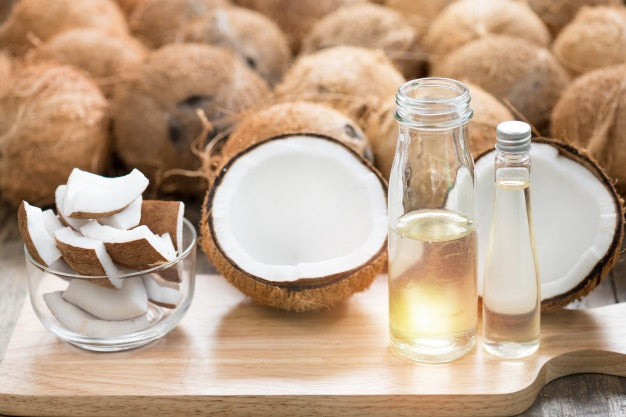2020 is almost over! This year has been challenging for everyone, and we can't thank you enough for your continued support as a valued member of the CocoTherapy family. We hope you enjoy the holiday season and all the best for 2021!
In this last post of the year, we'd like to take the opportunity to highlight some of our favorite CocoTherapy blog posts of 2020. We hope you find it as useful as our best of the CocoTherapy blog posts from 2017, 2018, and 2019.
As always...if you read and share only one of our posts this year, make sure it's this one! We think you'll find a ton of practical value to help you take care of your furry friends and keep them happy and healthy for years to come.
This year we covered a wide range of topics on the blog. So, for easy reference we've categorized this mega-post into 3 easy-to-navigate sections: The Science Behind Coconut Oil, General Pet Health, and Coconut Oil & MCT Oil for Specific Health Issues. Scan the post for a quick roundup of the various topics and click on the titles to read the full posts.

The Science Behind Virgin Coconut Oil
Mounting scientific evidence demonstrates the amazing health benefits of virgin coconut oil. In the following posts, we take an in-depth look at the science behind this unique and versatile dietary supplement:
The Lauric Acid Debate: Is it a LCFA or MCFA? Is it Good for you, or Bad for you?
Lauric acid is the most abundant medium-chain fatty acid (MCFA) in virgin coconut oil. It's a powerful "super ingredient" that provides a wide range of health benefits for pets, including the power to boost the immune system, protect the skin and coat, and keep the gastrointestinal tract healthy. In this post, we dive into the lauric acid debate and clear up some common misconceptions. We also take an in-depth look at how MCFAs are metabolized by the body.
How MCFAs Train the Immune System
Did you know that MCFAs help train the immune system during infancy and keep it in good working order throughout our lives? In this post, we take a look at the science behind the immune-boosting properties of MCFAs. We also explain how virgin coconut oil can help boost the immune system in people and pets. Check out the full post for the lowdown on MCFAs and immunity.
The Proven Antiviral Properties of Coconut Oil
Coconut oil has long been known for its antiviral, antibacterial, antifungal, and antimicrobial properties, and there's plenty of scientific research to support this. So, since coconut oil is known for its powerful antiviral properties, can it kill the coronavirus and influenza virus? In this informative post we explore the evidence and offer some advice to help you protect your pets during the COVID-19 pandemic.
3 Studies That Demonstrate The Powerful Anti-Inflammatory Effects of Coconut Oil
In 2019, CocoTherapy CEO & co-founder, Charisa Antigua conducted an in-depth interview with world-renowned lipids expert, Dr. Bruce Fife, C.N., N.D. In the eye-opening interview, Dr. Fife busted some of the myths surrounding coconut oil and explained why it's a healthy dietary supplement. In this post, we explore one of the topics that was touched upon in the interview – the powerful anti-inflammatory effects of coconut oil. We also highlight three separate scientific studies on virgin coconut oil and inflammation.
General Pet Health
Here at CocoTherapy, it's our mission to help your pets live longer, happier, and healthier lives. In the following posts, we provide some practical tips to help you take care of your pet's health and wellbeing:
How to Choose the Right Veterinarian for Your Pet
Choosing the right veterinarian for your pet is an important decision, and there are a number of factors that should be taken into consideration. These include your pet's age, any health issues they may have, the veterinarian's expertise or specialty, and the quality of the facility and equipment. It's also important to choose a vet who shares your beliefs and will be an advocate for the life of your pet. In this post, we share our top tips to help you choose the right veterinarian for your pet.
Top 5 Healthy Supplements for Dogs & Cats
Proactive pet owners know better than to wait until their dog or cat starts suffering from severe health conditions like osteoarthritis, leaky gut syndrome, and infections before introducing supplements into their diet. They also know that supplements can help them save money on costly veterinary bills over the long term. In this post, we take a look at a few of the most basic, beneficial supplements you can add to your pet's diet.
Ketogenic Diet for Dogs
According to the Animal Cancer Foundation, roughly 6 million dogs in the US are diagnosed with cancer every year. Studies have shown that the ketogenic diet helps dogs live longer, healthier lives by enhancing their immune system and helping their body defenses fight off cancer, epilepsy, diabetes, neurodegenerative disorders, and more. In this post, we take a look at what the ketogenic diet is and how it works. We also explain exactly why it can benefit your dog's health.
Is Saturated Fat Bad for Dogs and Cats?
If you're a long-time reader of our blog, you'll know that not all saturated fats are the same. Why? Because saturated fats are processed differently by the body depending on the length of the carbon chains in their fatty acids. You may have read other articles that state that coconut oil is bad for pets as it's primarily made of saturated fats. But the truth is that saturated fats are commonly misunderstood. In this post, we dive into the science and explain why dogs and cats were designed by nature to thrive on diets rich in saturated fats.

Virgin Coconut Oil & MCT Oil for Specific Health Issues
Virgin coconut oil and MCT oil provide countless health benefits for both pets and people. The following posts take an in-depth look at treating specific health issues with these beneficial supplements:
Can Dogs With Cushing's Disease Take Coconut Oil?
Cushing's disease (also known as hypercortisolism or hyperadrenocorticism) is a thyroid disorder that's most common in middle-aged and senior dogs. In this post, we take a look at the causes, symptoms, and treatment of Cushing's disease in dogs. We also explain why virgin coconut oil can be helpful for managing the condition.
Can Coconut Oil Cause Pancreatitis in Pets?
Have you ever wondered if coconut oil can cause pancreatitis in pets? You're not alone! It's a question we're often asked by concerned pet owners with animals that suffer from the condition. In this post, we take a look at what pancreatitis is and the symptoms it causes in pets. We also explore how diet can help manage pancreatitis, and whether or not virgin coconut oil is beneficial for pets with the condition.
Supporting Dogs with Seizures with Medium Chain Triglyceride (MCT) Oil
In this post, we take a look at a recent study that demonstrates how MCT oil can help support dogs with seizures. Check out the full post to find out more about this exciting new research and its implications. We also explain why CocoTherapy TriPlex MCT-3 Oil is highly beneficial for dogs with seizures.
Does Coconut Oil Cause Metabolic Endotoxemia in Dogs?
In recent years, coconut oil has enjoyed a reputation as something of a superfood, and it seems that everyone wants to enjoy its much-touted anti-inflammatory benefits. Animal lovers are no different, and it has proven particularly popular among dog owners as a tasty treat to feed their loyal companions. But is it safe? Rumors are circulating that coconut oil could cause metabolic endotoxemia in your pup. To find out the truth, we explore the science and facts behind coconut oil, metabolic endotoxemia, and dogs.
Bonus Post
Coconut Oil for Small Animals
According to recent statistics, around 14 million small animals are kept as pets in the US. This statistic does not include reptiles, of which there are an estimated 9.4 million. Some of the most popular small pets include rabbits, guinea pigs, hamsters, mice, gerbils, ferrets, snakes, and lizards. If you're the owner of a small animal, this post is for you! Click on the title to find out why coconut oil is beneficial for small animals, and how to use it with your pets.
Wrapping Up
That's it for our year-end mega-post! We hope you enjoyed reading and discovered some hidden gems on the blog. Thanks again for supporting CocoTherapy, and we look forward to serving you in the coming year. Enjoy the holidays, and we'll see you in 2021!
If you enjoyed this post, please share it with your friends and leave a comment below – we'd love to hear from you!



